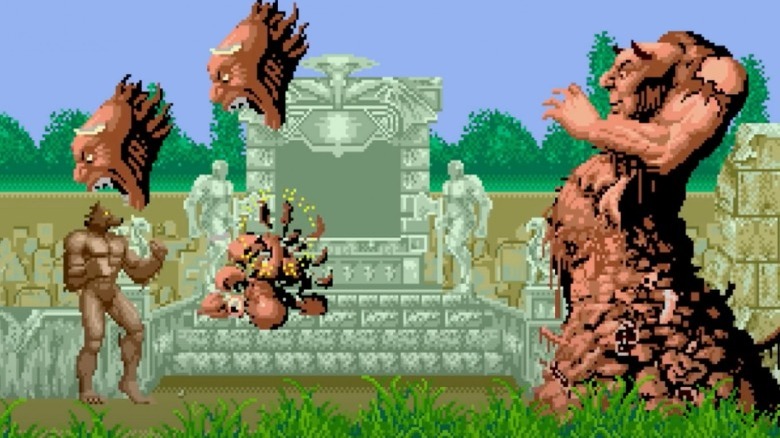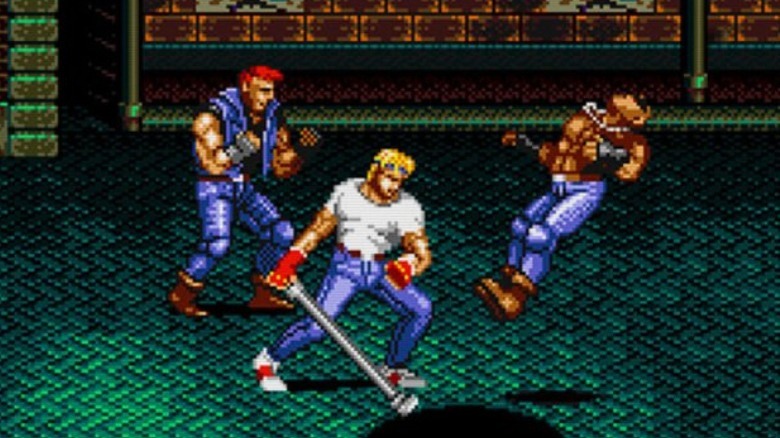How The Sega Genesis Struggled To Be Sold In Some Major Stores
There have been a lot of rivalries between gaming console manufacturers throughout the years, but few can match the battle that took place between the Sega Genesis and the Super Nintendo Entertainment System in the early 90s. Before the Genesis was released, Nintendo was viewed as the undisputed king of home gaming. It surpassed Atari in 1984 and went on to dwarf all competition for years. The Sega Genesis was the first console to offer the Mario platform any real competition, but it had to get pretty creative with some of its tactics. The Genesis had a two year headstart on the SNES, giving Sega a foothold in the market before Nintendo had a chance to cross the 16-bit threshold. Then there was the fact that the Genesis had the superior processing power of the two, allowing Sega to make games like "Sonic the Hedgehog" which relied on rapidly generated screens in order to facilitate fast-paced gameplay (via History-Computer). This gave Sega something Nintendo didn't have, and an angle from which it could market its console as the superior option. The other thing Sega did was unleash a campaign of aggressive ads that directly challenged the SNES, criticizing it for being slower and more expensive while also playing up the Genesis as a counter-culture alternative to Nintendo's family-friendly brand. While both of these tactics did wonders for the Genesis' popularity among gamers, there was a time when Sega had trouble even getting the console into stores.
Some retailers weren't interested
Travis Fahs of IGN wrote a piece detailing the history of Sega and its impact on the gaming industry over the years (via WayBackMachine). In it, he described how one of the major roadblocks that Sega seemed to face came from Walmart, Target and K-Mart. These retailers didn't want to carry the Genesis in their stores. Fahs attributed this primarily to brand recognition. Nintendo was a known commodity much in the same way that Atari had been before it. It might seem silly that major retailers like these wouldn't want to carry any major gaming console these days, but the risk in purchasing large quantities of inventory on these relatively expensive electronics seemed to make them hesitant.
This is around when Tom Kalinzke was brought on as the CEO of Sega of America and was tasked with coming up with a new strategy for increasing console sales. To do this, he started the "Welcome to the Next Level" advertising campaign which was the seed of the brand's cultural identity, he lowered the price of the console, he made the company include a copy of "Sonic the Hedgehog" with every unit sold, and he devised a plan for getting the Genesis into Walmart.
Sega ads targeted Walmart HQ
It seems that of all the retailers that wouldn't carry the Genesis, Walmart was Sega's primary target. Fahs' article also details a plan that Kalinzke enacted in order to get Walmart to carry the Sega Genesis.
It basically went like this: Walmart's headquarters are located in Bentonville, Arkansas, so Kalinske made it Sega's mission to fill the town with as much Sega merch and advertising as possible in order to make sure the executives working there wouldn't be able to turn around without seeing the name "Sega." The piece states that they rented out a store in the mall to fill with Genesis demo units for the locals to come in and play, they covered every billboard, filled up all the radio ad-space, and even bought marketing at the local college football stadium until everyone in Bentonville was clamoring for a Sega console.
Childish? Maybe, but apparently this method of blast-advertising actually put a lot of pressure on the retailer. The article cites Kalinske talking about the campaign, stating that, "after a few months of this, the executive vice president of purchasing Doug McMillan called me and said "please, just stop. We'll take Genesis into our stores."" This behavior may come across as a little shady, but there's no denying that it was effective.



